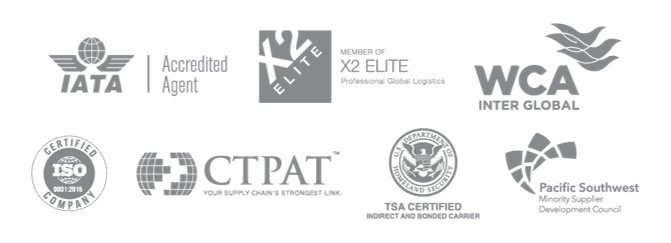FAQs
Top Logistics in Mexico and the USA: Frequently Asked Questions
About the Industry
The different types of containers used to transport goods include
- Dry Van Trailers are available from 48' to 53'. This trailer keeps material dry and clean, but has limitations on the type of freight it can carry.
- Flatbed, the standard flatbed is best used when height is not an issue. The bed height is typically 60 to 62 inches, leaving 8'4" to 8'6" of height available for legal shipments.
- Drop-Deck This trailer is used to haul equipment that is too tall for a standard flatbed to safely transport on the highway. The drop deck trailer can transport items up to 10'.
- LowBoy, the double-drop trailer can legally and safely haul units up to 11' 8".
- RNG The Double Drop with Detachable Deck, also known as the RGN, accommodates freight with a maximum legal weight of 44,000 lbs.
Explore further to determine which option best suits your requirements: Trailer Dimensions
At The ILS Company, we ask our carriers to provide us with the GPS location of their units to ensure constant visibility at all times. We have monitoring platforms for this purpose.
The cargo capacity of a container varies depending on factors such as cargo weight and volume, as well as applicable regulatory and technical restrictions. Generally speaking, a 20-foot container can hold 30 cubic meters of cargo, while a 40-foot container can hold approximately 60 cubic meters.
All equipment or property to be shipped must be properly prepared by the customer or designated representative prior to shipment.
- Equipment must be properly secured, packed, and prepared, including, but not limited to, installation of shipping brackets, support brackets, equipment restraints, and other moving or loose parts to prevent movement and damage during shipment.
- Equipment should be drained to remove all fluids.
Learn more: Packaging Best Practices
POD (Proof of Delivery) or Delivery Receipt is a document signed by the recipient to confirm that the goods have been delivered in good condition.
Incoterms are international rules that define commercial terms in logistics operations. They determine who pays for transportation, insurance, taxes, and when the seller's responsibility transfers to the buyer. Detailed information about Incoterms can be found in the following section: Incoterms.
The most common Incoterms are:
- EXW (Ex Works)
- FCA (Free Carrier)
- FOB (Free On Board)
- CIF (Cost, Insurance and Freight)
- DAT (Delivered at Terminal)
- DAP (Delivered at Place)
- DDP (Delivered Duty Paid)
- CIP (Carriage and Insurance Paid To)
These terms cover a wide range of commercial situations and are commonly used in international transactions. Detailed information and FAQs about Incoterms can be found in the section Incoterms.
The selection of the appropriate Incoterm depends on the specific needs of the transaction and the agreement between the parties. It is recommended that the parties consult with logistics and international trade professionals to select the most appropriate Incoterm for their particular situation. Learn more to determine which Incoterm is most appropriate for your operations: Incoterms.
Mexico-USA Cross-Border
The main border crossings between Mexico and the United States are Laredo, El Paso, Nogales and Tijuana.
- Have an invoice with a foreing trade endorsement.
- Use the services of a Mexican customs broker.
- Hire the services of an American customs broker.
- Obtain a Certificate of Origin to potentially benefit from tariff advantages, if applicable.
Learn more about: Mexigo
- Engage the services of a Mexican customs agent.
- Obtain a Certificate of Origin for potential tariff benefits, if applicable.
There are cases where direct transportation can be carried out (without the need for transshipment or changing trailers), it is essential to consider that, although there may be a change of trailer and driver, the cargo does not undergo handling at any time. However, it is important to note that there are cases where transshipment is carried out at the border, which implies that the cargo trailer may not be the same; this will depend on the customer's requirements.
In land transportation, we offer two options for handling cargo in full boxes: the direct box and the transshipment box. The first, known as a direct box, implies that the same box loaded at the place of origin is the one delivered at the destination.
In land transportation, we offer two options for handling cargo in full cases: the direct case and the transshipment case. In the case of the transshipment box, a unit is sent to pick up the goods and upon arrival at the border, the transshipment maneuver (transpalleo) is performed to an American unit. The latter is responsible for delivery at the destination.
Shipping to or from Mexico may not be as daunting as you think, but there is a process to follow. We'll help you get ready:
- Identify all parties involved in your import/export transaction.
- Identify all the paperwork required to complete the transaction.
- Once your shipment has gone through all the necessary inspections at both customs, your shipment is cleared and ready to go to its final destination.
Here's a brief overview of the border crossing process. Your guide to seamless shipping from Mexico to the USA
Import - Export
Import taxes in Mexico can vary depending on the type of product and its country of origin. Generally, they include value-added tax (VAT) and customs duties. It is important to know the correct tariff classification and to consult with experts in international trade to calculate and comply with the applicable import taxes. You can consult the SAT (Tax Administration Service) website to check the applicable import taxes.
Some common examples of products that are often subject to restrictions include:
- Agricultural and food products.
- Chemicals and hazardous materials.
- Pharmaceuticals and medical devices.
- Weapons and materials related to national security.
- Cultural and artistic products.
- Knowing the origin and destination of the cargo to make the best route recommendation and therefore the most convenient customs.
- Type of goods. • Contact information of the shipper and consignee.
- Delivery dates.
The basic information needed to provide an quote for international shipping quote includes: origin of the cargo, destination, weight, dimensions of the cargo, and type of goods. Do you have a quote request? Fill out this form
The cargo capacity of a container varies depending on factors such as the weight and volume of the cargo, as well as applicable regulatory and technical restrictions.
Generally speaking, a 20-foot container can transport 30 cubic meters of cargo, while a 40-foot container can transport around 60 cubic meters.
Air and Ocean Transportation
The main ports of entry and exit to Mexico are Veracruz, Veracruz; Altamira, Tamaulipas; Manzanillo, Colima; Lazaro Cardenas, Michoacán; and Ensenada, Baja California.
From Asia, the arrival ports are Manzanillo, Lazaro Cardenas, and Ensenada. From Europe, the natural arrival ports are Veracruz and Altamira.
The main entry and exit airports in Mexico for international cargo, along with their IATA codes (International Air Transport Association), are:
- Mexico City International Airport (MEX)
- Guadalajara International Airport (GDL)
- Monterrey International Airport (MTY)
Logistics and Warehousing
VMI Vendor Managed Inventories is a service that allows our customers to maintain a lean inventory and manage their costs. The flexibility of our services allows our customers to have an improved supplier relationship:
- Min, Max, reorder notifications.
- Multiple supplier management.
- Supplier purchase requisitions; Web access.
The benefits of establishing manufacturing operations in Mexico can include access to a competitive labor market, lower production costs, proximity to North American markets, and tax and trade benefits resulting from international agreements such as the USMCA. If you would like to learn more, you can consult: Benefits
The use of artificial intelligence in logistics has some very important applications that have revolutionized this industry.
- Transportation coordination and optimization.
- Trend forecasting.
- Automated warehouses.
- Inventory management.
Learn more: Artificial Intelligence in logistics
According to the Mexican Ministry of Economy, key sectors for nearshoring growth in Mexico include automotive, electrical and electronics, medical devices and pharmaceuticals, semiconductors, and agribusiness. The Inter-American Development Bank (IDB) estimates that between $1.75 billion and $2.25 billion will be allocated for financing over the next three years. This financing will focus on the construction of industrial parks, new investments by key companies, and the development of innovative mechanisms to expand support for small and medium-sized enterprises participating in global value chains.
For more information on nearshoring, please refer to our article on the Nearshoring.
About ILS
ILS Company offers a full range of ground transportation services in Mexico and the United States, as well as international air and ocean options. In addition, we offer comprehensive warehousing and distribution solutions to maximize the efficiency of your supply chain.
The ILS Company has 4 distribution centers strategically located in the northern and central regions of the country, which are in Guaymas, Sonora; Saltillo, Coahuila; Hermosillo, Sonora; and El Marqués, Querétaro. Find the contact details here
The ILS Company has offices in Coahuila, Sonora, Queretaro, Guadalajara, Jalisco; San Luis Potosi, SLP; Mexico City, and the Corporate Office in Tucson, Arizona.
A 3PL logistics company is a company that provides multiple logistics services to customers. Preferably, these services are integrated or "bundled" by the provider. These companies facilitate the movement of parts and materials from suppliers to manufacturers and finished products from manufacturers to distributors and retailers. The services they provide include transportation, warehousing, cross-docking, inventory management, packaging, and freight forwarding." Council of Supply Chain Management Professionals ("CSCMP") In this article, you can clarify some of the myths surrounding 3PLs.
The following information is necessary for the ILS Company sales team to prepare and submit a service proposal:
- Contact Name
- Company Name
- Email Company
- Service: Int Ground Transportation, Air Transportation, Ocean Transportation, MX/US Cross-Border or Warehousing
- Origin
- Destination
- Commodity
- Cargo Value
- Shipping date
- Frecuency
- Weight
- Dimensions
- Type of Equipment: Full Truck/ Reefer/ Flatbed / Stepdeck / LTL/ Intermodal / Air/ Ocean
If you need a quote, please fill out request a quote here
The trailer models presented below are the most common ones. The equipment may vary slightly, and indeed it does, especially in height. If height is critical, make sure to consult with the transportation company before collection.
- Drivan
- Flatbed
- Step-Deck
- Double-Drop (Lowboy)
- RGN
Currently, ILS Company is certified and validated by C-TPAT (Customs Trade Partnership Against Terrorism) and is also in the process of certification for the Authorized Economic Operator (AEO) program.
ILS has implemented several processes to enhance tracking controls and protection of goods, including route risk analysis, custody services, 17-point inspections, and K9 inspections at the border prior to entry into the United States.
ILS Company provides supply chain security training programs for both our customers and our suppliers. We organize annual meetings to share security best practices in the market. In addition, we conduct various activities such as drills and audits upon client request.
The requirements to be a Carrier for ILS Company are:
- Motor Carrier Authority Number (MC #)
- A minimum fo $1,000,000 in auto liability insurance with The ILS Company, LLC listed as the certificate holder
- A minimum of $100,000 in cargo insurance with The ILS Company, LLC listed as the certificate holder.
- Worker’s Compensation insurance with at least minimum state requirements.
- Carrier must have no major complaints on file with any external compliance sites.
- Carrier must have a D.O.T. Safety Review rating of “Satisfactory” or “None”.
- Carrier must return a signed copy of The ILS Company Broker-Carrier Contract and Agreement.
Together We create synergy, explore for insight Carriers
The surcharges that a shipping line may apply include:
- Bunker Adjustment Factor (BAF).
- Emergency Risk Surcharge (ERS).
- Port Congestion Surcharge.
- Overweight Surcharge.
- Peak Season Surcharge (PSS).
- Hazardous Cargo Handling Surcharge.
These surcharges may vary depending on various factors such as cargo type, route, and market conditions. It's important to review the terms and conditions of the transportation contract to understand all applicable surcharges.
Customers
At The ILS Company the administrative staff works Monday through Friday from 8:00 am to 6:00 pm, and the operational staff works Monday through Friday, 24 hours a day, 7 days a week, 365 days a year. The only days we do not work are December 25th and January 1st.
On ILS Company's website, we have a "Customer & Carrier Login" section where, by requesting a username and password from your account manager, our customers can access a dashboard where they will find information about the current year's shipments. They can also view the history of shipments by filtering by date from start to finish, and export to Excel if they wish.
On the ILS Company website, you can request access to view costs and invoices with prior authorization.
On the ILS Company website, with a username and password, you can track the progress of sent shipments since the GPS of our carrier suppliers is integrated with our system.
Navigating logistics between Mexico and the U.S. can be complex.
Our passion is to accompany you through the process while delivering your merchandise on time! We are more than just a logistics company, we are the strongest link in your supply chain!




